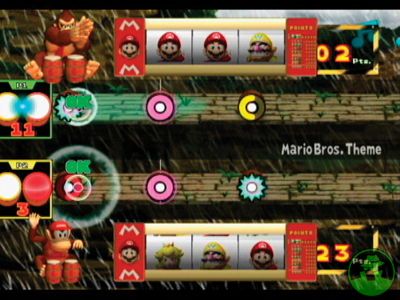It was certainly an odd decision for Nintendo to take one of its most beloved characters and place him in a music game, but one needn't worry about this being a quick cash-in on a suddenly popular genre. Donkey Konga is the real deal. It's developed by Namco and based on the company's mega popular (in Japan at least) series, Taiko no Tatsujin, which will soon get a U.S. release under the name Taiko Drum Master.
In fact, Konga's gameplay is quite similar to Taiko's (and most music games, for that matter). What makes Konga unique is the bongo controller that you play the game with. The DK Bongo, as it is properly called, is a fairly good size, and can comfortably fit it in your lap as you play (you'll probably prefer setting it on a table, however). The plastic housing and rubber top are very durable as the bongo is literally made to take a pounding.
Once a song beings playing, indicators scroll from the right side of the screen showing you what you need to hit on the bongo. This will be either the left bongo, the right one, both simultaneously, or a clap. Yes, thanks to the DK Bongo's built in microphone, the game registers when you clap your hands. The mic can be a bit too sensitive sometimes, picking up your voice and whatnot, but you can adjust the sensitivity in the options menu.
Slapping the Skins
There's something to be said for the tactile sensation of banging away on a pair of bongos while you play. It really draws you into the experience, and once you begin mastering more complicated songs, you feel like you're playing an actual musical instrument.
Like most music games, the song selection is crucial to your enjoyment. There are 33 songs to choose from in Konga with styles ranging from kid's songs ("She'll Be Coming 'Round the Mountain," "Itsy Bitsy Spider" ... that sorta thing) to country to oldies to classical to modern hits to Nintendo music (bongoing along to a jazzed-up version of the Super Mario Bros. theme is a treat). So yeah, there's definitely some variety, although it would have been nice to have a few extra songs that required unlocking. None of the licensed songs are performed by the original artist, but in most cases, it's a pretty good representation. The big exception is the new version of the party song classic, "Louie Louie," which I discovered isn't nearly as good if the singer properly annunciates the lyrics.




 Good
Good



